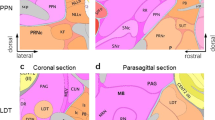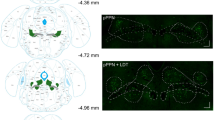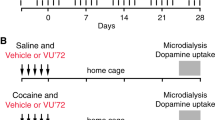Abstract
MOST of the different neurotransmitter systems have been implicated in opiate withdrawal. Frederickson and Pinsky1 suggested a primary role for acetylcholine (ACh) in both the development and the expression of dependence on morphine but the specific role of cholinergic mechanisms in opiate withdrawal is not yet clear and deserves further attention. The hypothesis of the role of ACh in the expression of withdrawal phenomena, on which most earlier experiments were based, was that of the ‘cholinergic excess’, first postulated by Paton2. Tests of this hypothesis in various laboratories have, however, produced conflicting results and thus confusion rather than clarification of the role of cholinergic mechanisms in the withdrawal syndrome3–9. Unfortunately, many such studies have neglected to differentiate between peripheral interference with expression and central interference with initiation of the signs of withdrawal by the various drugs studied. Our experiments were designed to eliminate this particular factor, which has contributed to much of the conflict. The results clearly illustrate the confounding effect of failure to separate peripheral from central cholinergic effects and suggest that the exact opposite of the cholinergic excess theory is the actual nature of the central cholinergic role in the morphine withdrawal syndrome.
This is a preview of subscription content, access via your institution
Access options
Subscribe to this journal
Receive 51 print issues and online access
$199.00 per year
only $3.90 per issue
Buy this article
- Purchase on Springer Link
- Instant access to full article PDF
Prices may be subject to local taxes which are calculated during checkout
Similar content being viewed by others
References
Frederickson, R. C. A., and Pinsky, C., J. Pharmac. exp. Ther. 193, 44–55 (1975).
Paton, W. D. M., Can. J. Biochem. Physiol., 41, 2637 (1963).
Fuentes, V. O., thesis, Univ. Nottingham (1970).
Grumbach, L., Fedn Proc., 28, 262 (1969).
Kolb, L., and Himmelsbach, C. K., Am. J. Psychiat., 94, 759 (1938).
Rhamken, I. F., Psychopharmac. Abs., 7, 12 (1968).
Bhargava, H. N., and Way, E. L., J. Pharmac. exp. Ther., 183, 31 (1972).
Pinsky, C., Frederickson, R. C. A., and Vazquez, A. J., Nature, 242, 59 (1973).
Collier, H. O. J., Francis, D. L., and Schneider, C., Nature, 237, 220 (1972).
Frederickson, R. C. A., and Smits, S. E., Res. Comm. cheni. Path. Pharmac., 5, 867 (1973).
Collier, H. O. J., Nature, 220, 228 (1968).
Collier, H. O. J., in Scientific Basis of Drug Dependence (edit, by Steinberg, H.), 49–66 (Churchill, London, 1969).
Labrecque, G., and Domino, E. F., J. Pharmac. exp. Ther., 191, 189 (1974).
Author information
Authors and Affiliations
Rights and permissions
About this article
Cite this article
FREDERICKSON, R. Morphine withdrawal response and central cholinergic activity. Nature 257, 131–132 (1975). https://doi.org/10.1038/257131a0
Received:
Accepted:
Issue Date:
DOI: https://doi.org/10.1038/257131a0
Comments
By submitting a comment you agree to abide by our Terms and Community Guidelines. If you find something abusive or that does not comply with our terms or guidelines please flag it as inappropriate.



